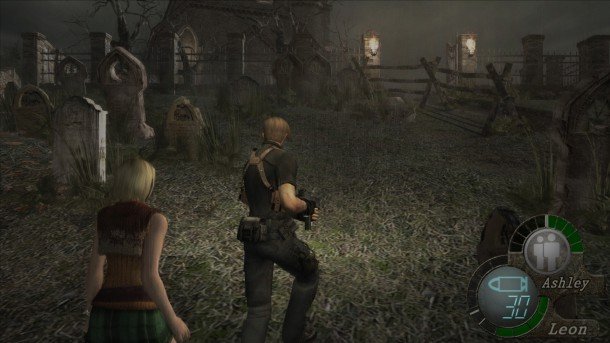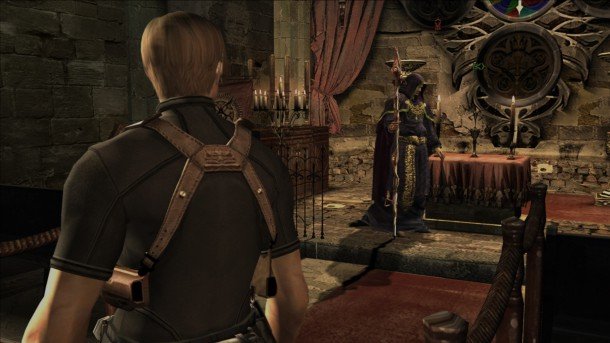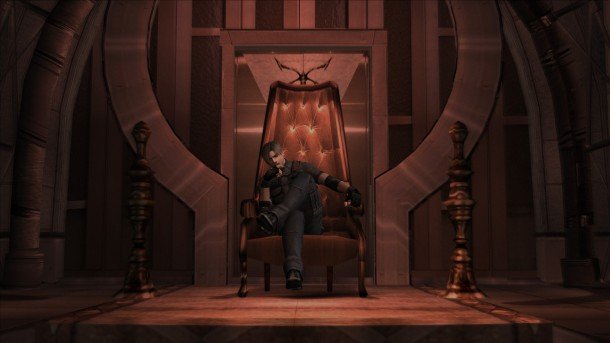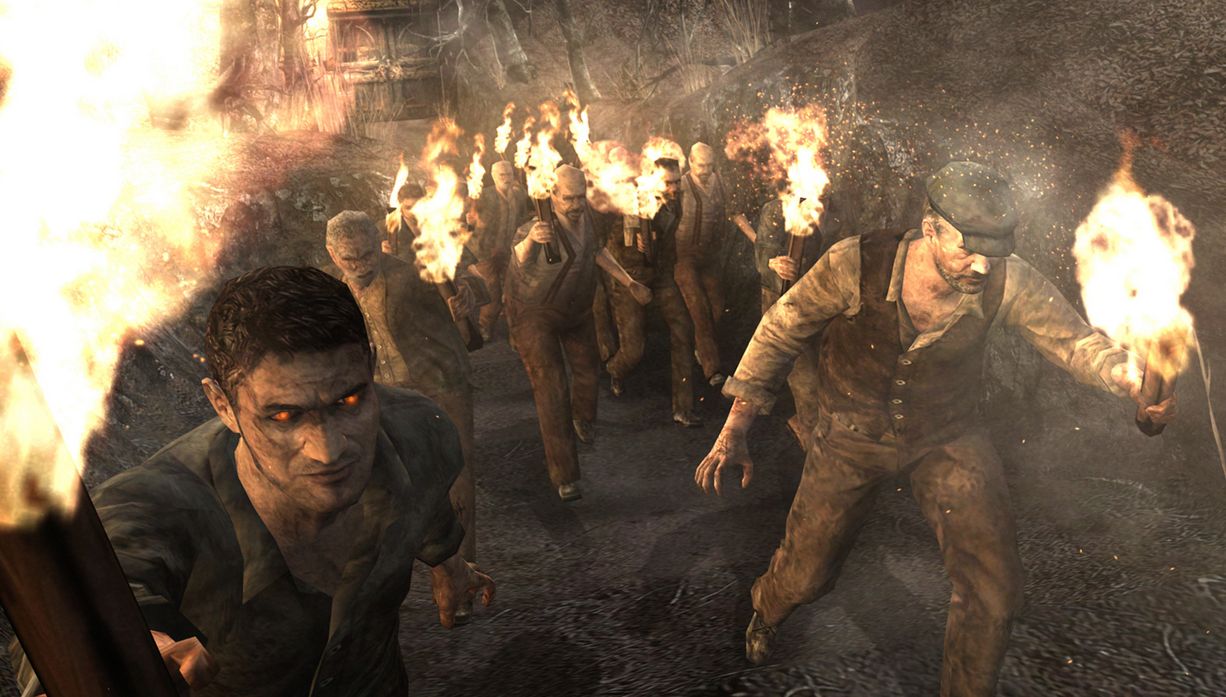Our Verdict
Resident Evil 4 is still a masterful shooter nine years later. Occasional slowdown caused by the locked 60 fps framerate hampers an otherwise great port.
PC Gamer's got your back
Resident Evil 4 is nine years old, and still the best action game I've ever played. It's still thrilling when I nail four Ganados with a single shotgun blast, still tense when I face down a relentless Iron Maiden before it impales me with deadly spikes. I'm on edge even when I know I'm safe, still creeped out by the foreboding pressure Resident Evil 4 constantly exerts through its thumping industrial soundtrack and grim environments.
Most of the time, this updated HD version of Resident Evil 4 is the best version of the game I've played, and I beat it on both the GameCube and the Wii. I wish it were perfect, but it's not quite there—occasional moments of slowdown and a few interface issues are minor flaws in an otherwise fantastic port.

If you've dodged RE4 in anticipation of a port like this, know that the story is cheesy and melodramatic in classic Resident Evil fashion. Curtain-haired hero Leon S. Kennedy lands in Spain to rescue the president's daughter from Los Ganados, infected villagers who stand in for zombies. What starts as ambiguously scary becomes increasingly insane as melodramatic figures like knife-wielding maniac Jack Krauser and tiny Napoleon man Ramon Salazar step into the frame.
Despite its age, Resident Evil 4 doesn't feels dated. Its best combat sequences are open-ended in a way we still rarely see in shooters, and I love the freedom of choosing how to approach that first house in the village, the cabin showdown with Luis, and the castle's grandest rooms.
Playing on the PC only makes the game better. I thought that the aiming precision of the mouse might make headshots too easy, leaving Leon's attache case brimming with unused rounds. But on normal difficulty, RE4 still feels remarkably balanced. Headshots are easier, yes, but tougher enemies can soak up the bullets, and swarms can still overwhelm me and cause me to miss plenty of headshots. That tuned-to-perfection over-the-shoulder camera angle keeps Leon vulnerable when I take aim. I jumped with surprise a couple times when Ganados snuck up on me from outside my field of view.
Capcom didn't build an FOV slider into this PC port, but even a small change to that field of view could ruin the fine line of empowerment and danger RE4's combat dances on. Capcom did include some basic PC options for adjusting key bindings and display resolution, though the game runs letterboxed on 16:10 monitors and doesn't let you customize each key in the options. And while mouse support works great for shooting, it hasn't been fully integrated with the the rest of the in-game interface. You can't use the mouse to move items around in the briefcase, and instead have to use a clunky combination of Backspace and the Page Up/Down buttons to pick up and rotate items around.

Those keys can't be remapped, which is annoying. Another quibble: two of the buttons used for quicktime events, X and C, are hard to press quickly when your fingers are poised over WASD. Thankfully, more important keys can be remapped, and I liked having the run button tied to my mouse for quick getaways. The Xbox 360 controller is also fully supported, including new in-game graphics for all of its buttons.
The most significant additions Capcom made to this version of Resident Evil 4—higher definition textures and a locked 60 fps framerate—are both adjustable in the graphics options settings. The game defaults to the new HD textures and 60 frames per second, but also includes the original textures and a 30 fps option.
I played the game at both 1920x1200 and 2560x1440 on two PCs, thanks to Steam Cloud support, and thought the character models and lighting held up well. They haven't been dramatically altered—higher resolution textures mean the characters and environments look sharp even at 1440p—but the models are still limited to their original polygon counts. Some environmental textures are mottled and ugly, others surprisingly detailed. And after playing at 60 fps, the original framerate feels comically sluggish.
There's a problem with that locked 60 fps, though—if anything causes the game to dip below 60, which happened to me multiple times in my playthrough, it starts moving in slow motion. Audio and video desynchronize. This typically happened to me when graphical effects like the heat waves around a torch appeared on screen, or when a ton of enemies crowded into my field of view. But I also sat through a pair of cutscenes at 40-50 fps, causing video to lag four or five seconds behind the audio. Another cutscene wasn't quite lip-synced properly, either, even though FRAPS said I was maintaining a solid 60 fps.

Most of this slowdown happened on an older Radeon 5970, but I experienced it once or twice on newer Radeon 7870 and R9 290X cards, too, with 2x anti-aliasing and motion blur enabled in the options. It shouldn't be this hard for a nine-year-old game to hold a solid 60 frames per second, and even the 5970 is a far more powerful GPU than what the GameCube had in 2005.
Even with intermittent slowdown issues on older hardware, I'd call this the definitive version of Resident Evil 4. It's clean and sharp at 1440p, mouse aiming feels fantastic without being game-breaking, and 60 fps feels as smooth as it should. And Resident Evil 4 itself feels as impeccably designed as ever, a high point against which other third-person shooters should be judged. If Capcom Frankensteins some 8K textures into it in another 10 years, I'll probably buy that version, too.
Resident Evil 4 is still a masterful shooter nine years later. Occasional slowdown caused by the locked 60 fps framerate hampers an otherwise great port.

Wes has been covering games and hardware for more than 10 years, first at tech sites like The Wirecutter and Tested before joining the PC Gamer team in 2014. Wes plays a little bit of everything, but he'll always jump at the chance to cover emulation and Japanese games.
When he's not obsessively optimizing and re-optimizing a tangle of conveyor belts in Satisfactory (it's really becoming a problem), he's probably playing a 20-year-old Final Fantasy or some opaque ASCII roguelike. With a focus on writing and editing features, he seeks out personal stories and in-depth histories from the corners of PC gaming and its niche communities. 50% pizza by volume (deep dish, to be specific).


